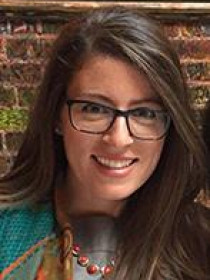
Daniela Kruel DiGiacomo
Connect with Daniela
About Daniela
DiGiacomo's research focuses on the study and design of relations, activities, experiences, and spaces that support the emergence of relational equity between adults and young people in informal and formal educational settings. Overarching themes in DiGiacomo's writings include issues related to youth development, interest-driven learning, adult-youth relations, and questions of power and privilege in the design of learning environments. DiGiacomo is also a Research Associate for the Civic Engagement Research Group, a national research group focused on the study and amplification of youth civic engagement efforts at the classroom, school, district, and state level.
Contributions
How New Technologies are Reshaping Education and Bringing Big Data to Schools
Publications
Draws on a large corpus of interview data from a longitudinal study of fifty-four adolescents involved in interest-driven afterschool activities domestically and abroad. Investigates the role of youths' interests in their everyday lives. Reveals the material and social constitution of interest itself. Calls for increased attention to the interplay between social relations and material realities as key mediators of contemporary learning opportunities.
Theorizes further the notion of relational equity in the context of technology supported learning ecologies. Draws upon examples from multi-year investigations in case studies in Colorado and California. Outlines an emerging framework for how to organize learning ecologies in ways that encourage more symmetrical and equitable relations amongst adults and youth across various lines of difference.
Draws upon a multi-year collaborative investigation into how the extended/expanded learning time reform was taken up by various stakeholders (parents, children, teachers, policy-makers, community/state organizations) in the Denver metropolitan area. Makes visible the ways in which theory matters for the near- and long-term viability of equity-focused educational reforms.
Advances the theoretical notion of ‘relational equity’ among intergenerational participants— that is, relationalities between teachers and learners in which neither’s way of being in the world, or making sense of it, is taken as primary. Informed by three years of participation as a researcher, program support, and undergraduate instructor within an afterschool university-community partnership program in Colorado, this piece speaks directly to the role of human relationships as a critical tool in the design of more equitable learning opportunities for young people.